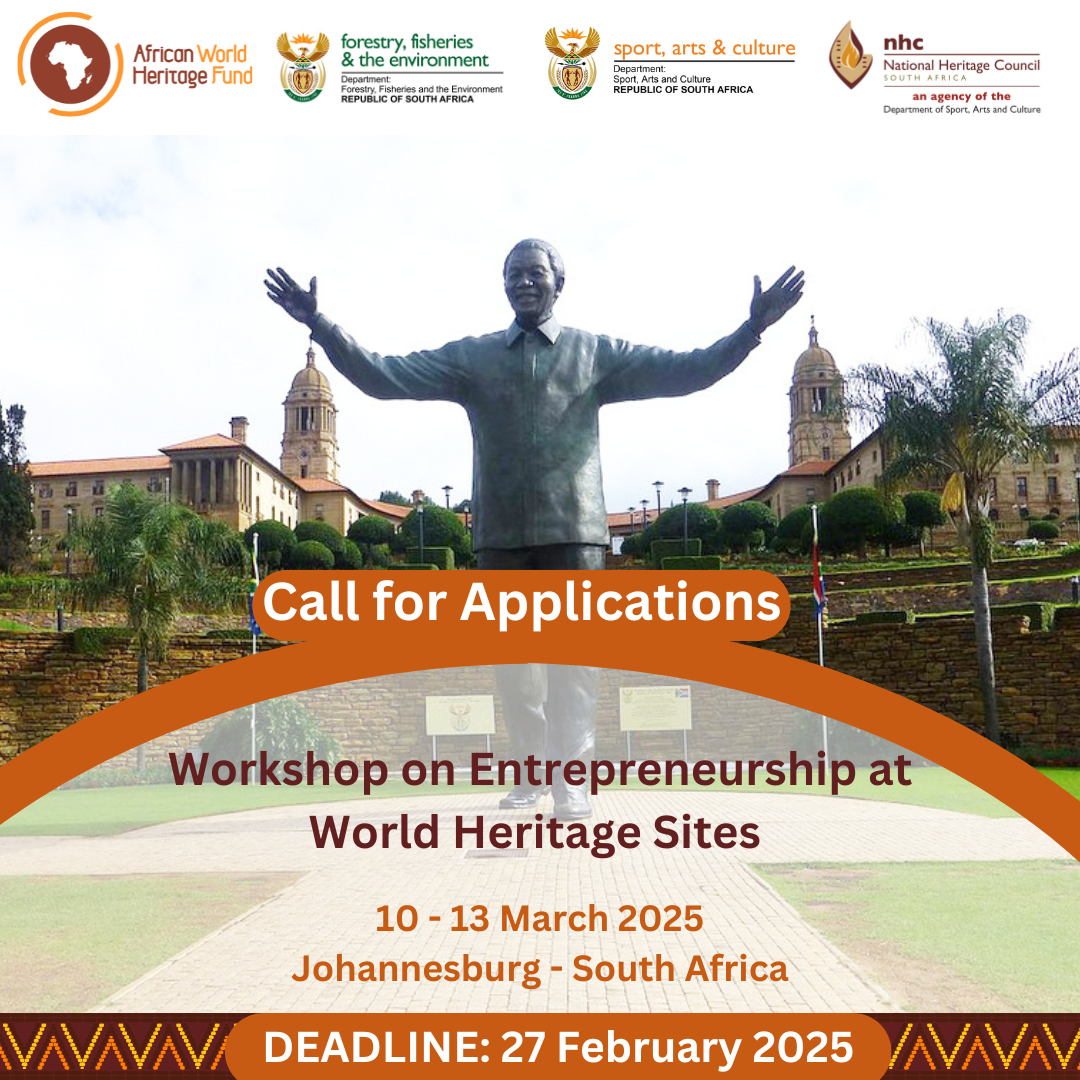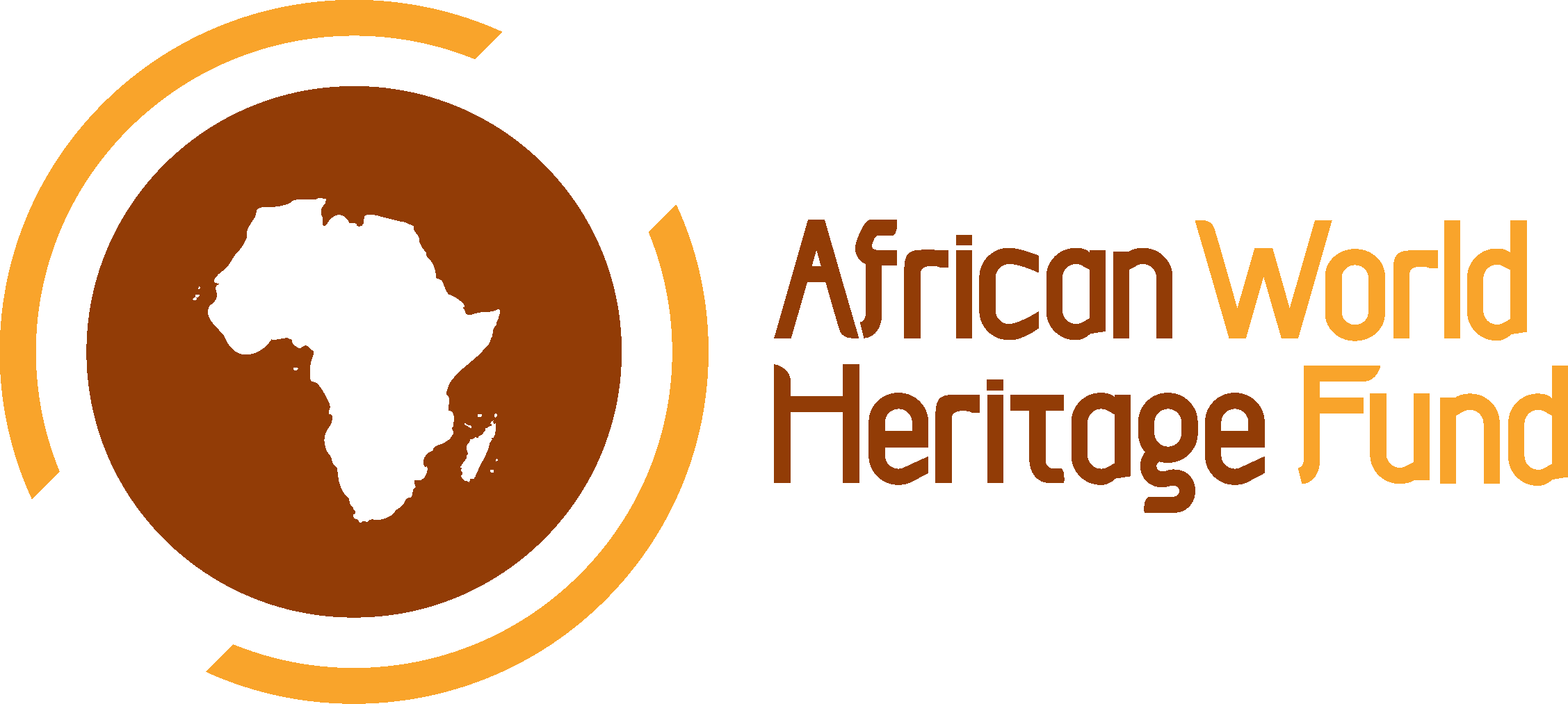
CALL FOR PARTICIPATION
Deadline for Application: 27 February 2025
Workshop on Enterpreneurship at World Heritage Sites
10 to 13 March, Johannesburg – South Africa
Background
The African Union Agenda’s ten-year implementation plan aims to achieve a 25% reduction in unemployment by 2024 and to specifically reduce youth and women’s unemployment by 2% per year. Entrepreneurship has been identified as a key driver towards the structural economic transformation envisioned in agenda 2063, with the potential to create millions of jobs, reduce poverty and generate innovations in fields contributing towards sustainable development on the continent.
There is a strong potential for investment in supporting and strengthening the heritage sector in Africa for the youth, creating momentum for heritage assets, generating income and creating jobs, protecting identities, promoting cultural diversity and social inclusion. Yet, the cultural and natural heritage in Africa is exposed to a number of threats related to climate change; loss of traditional know-how, customary and intangible practices; insecurity, acts of vandalism and armed conflict; and lack of visibility as well as issues related to unsustainable promotion and tourism development. Therefore, addressing the challenges of heritage promotion, management and conservation of heritage in harmony with sustainable development in the continent requires a multi-pronged approach grounded on the active involvement of the African communities through concrete actions.
Since 2011 the African World Heritage Fund (AWHF) has been implementing a programme to promote the entrepreneurship initiative within and around World Heritage sites. The initiative is a result of the Second and Third Cycles Periodic Reporting for Africa (2011-2017) which identified priority needs to be addressed in fulfilling the implementation of the World Heritage Convention. Among the needs identified, was the direct involvement of local communities and direct economic benefits from World Heritage. The goal is to have communities deriving socio-economic benefits from heritage resources, which will improve the livelihoods of communities as well as to ensure sustainability of the heritage resources. As such, the involvement of communities in conservation creates opportunities for heritage awareness and development of sustainable tourism activities. It is widely recognised, through effective and sustainable management, that Africa’s World Heritage is able to act as unique catalysts in transforming Africa’s image and act as a vehicle to stimulate socio-economic growth on the continent.
Objectives
The Workshop on Entrepreneurship at World Heritage Sites aims to explore the various approaches in the quest to boost socio-economic development, whilst simultaneously keeping an eye on global commitments, in particular the Sustainable Development Goals (SGDs). Sustainable economic development remains at the forefront of development agendas for African countries. Given the inscription of world heritage sites onto UNESCO’s world heritage list, unique opportunities do present themselves in terms of conservation of cultural and natural heritage which simultaneously stimulates economic activity, improve livelihoods and optimising further awareness and demonstration of the unique values and attributes linked to Africa’s iconic heritage places.
The capacity building event aims to provide participants with further knowledge, skills and awareness for managing world heritage places as it relates to entrepreneurship. It also aims to promote long-term networks for life-long peer learning and enhanced capacity building in the heritage sector.
Format of the Workshop
The workshop will be provided in an in-person sessions. All participants need to attend all sessions during the workshop period.
The workshop sessions
Sessions will be held in Johannesburg, South Africa, and will include lectures and seminars, group activities and discussion, as well as a site visit to a World Heritage properties with existing entrepreneurship programmes in South Africa. Participants will have the opportunity to engage in practical exercises and further the theoretical discussions focusing on a specific case study. This phase will comprise site visits and engagement with key stakeholders during field visits.
- The participants will be trained on the various aspects of general entrepreneurship and strategic business planning.
- Participants identified and documented business and entrepreneurial opportunities around the heritage sites.
- Identification of key local stakeholders, potential business partners and local authorities linked to the various project ideas.
- Creation of a network for communication and professional exchange, established for heritage professionals and local custodians.
The workshop sessions
Each participant is required to submit a case study (approximately 500 words) describing a World Heritage Sites in Africa, with the opportunity for entrepreneurship programmes, with which they have experience as a part of the application form. This experience will be presented during the course and will give participants a chance to become better acquainted with World Heritage in the region. The case study of Entrepreneurship World Heritage Sites in Africa must contain, at a minimum, the following sections, under the same headings:
- Introduction of the World Heritage Site, its significance, and its location. Explain why the site is relevant for entrepreneurship.
- Description of the Entrepreneurship Opportunities at the World Heritage Site. Outline the types of businesses that exist or could thrive in the area (e.g., tourism, handicrafts, hospitality, ecotourism, cultural performances). Highlight any existing successful enterprises.
- Challenges Facing Entrepreneurship within and around the World Heritage Site.Discuss barriers such as regulatory issues, funding constraints, environmental concerns, or lack of infrastructure.
- Socio-Economic Impact of Entrepreneurship at the Site. Explain how local communities benefit from business activities (e.g., job creation, cultural preservation, economic growth).
- Sustainability and Innovation in Entrepreneurship.Describe initiatives or strategies that promote sustainable business practices. Highlight innovative approaches (e.g., digital marketing, sustainable materials, community-led tourism).
- Recommendations for Enhancing Entrepreneurship. Suggest strategies to improve business opportunities while ensuring heritage conservation.
Selection criteria of participants
Participants for this workshop shall be selected based on the following criteria:
- Have at least 5 years of experience working in the field of cultural and/or natural heritage, including World Heritage area;
- Be fluent in the working language of the workshop (English);
- Demonstrable good knowledge of the World Heritage Convention and the Operational Guidelines for the Implementation of the World Heritage Convention;
- Experience in entrepreneurship at World Heritage sites;
- Be motivated, active and interested in engaging in the field of World Heritage;
The country and regional representation and gender balance will be prioritized.
Participation cost
The cost of the participant will be fully covered by AWHF and shall include roundtrip flight ticket to the Workshop host country, accommodation, meals and local transportation.
Application procedure
Each applicant should submit the following application package: The completed application form which includes:
- The completed application form which includes:
- Statement of interest (a motivation detailing the applicant’s reasons for applying);
- Presentation of a case study on Entrepreneurship within and around a World Heritage Site in Africa including all the elements outlined above. If successful, the case study will be presented during the workshop.
- Curriculum Vitae (maximum 4 pages) outlining the applicant’s current position, qualifications, areas of expertise, work experience in the field of cultural and/or natural heritage including on World Heritage, publications/reports;
To submit your application, APPLY HERE, by no later than 27 February 2025. For any queries regarding the application process please contact the Head of Partnerships at the AWHF, Ms. Veronica Maduna, (veronicam@dbsa.org).
